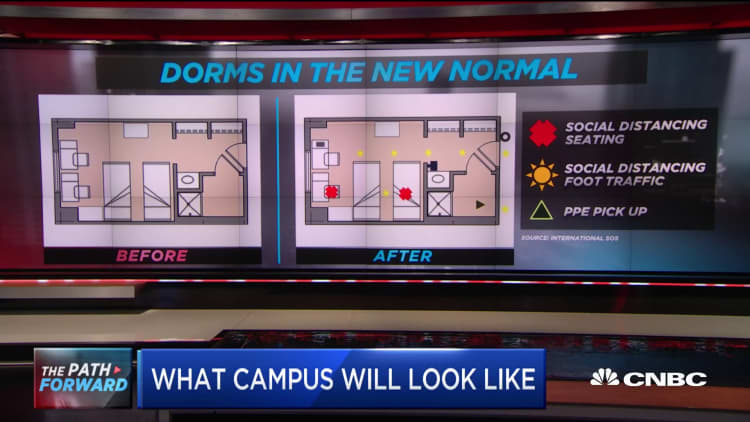Top college officials told lawmakers Thursday that universities will remain closed until officials can ensure it's safe to bring students back to campus, which will require extensive Covid-19 testing and contact tracing.
College campuses across the country will see new coronavirus cases whenever they do reopen, regardless of whatever they do to prevent an outbreak, Dr. Georges Benjamin, executive director of the American Public Health Association, told members of the U.S. Senate committee on Health, Education, Labor and Pensions. Without adequate testing, universities "can't function at all," he said.
"All the current evidence shows that we will continue to have undetected, broad community spread of Covid-19 and will continue to do so for many months to come," he said.
Purdue University, which plans to reopen its campuses this fall, won't test all students for the coronavirus when they return, President Mitchell Daniels told the committee. The school will instead focus its efforts on those who come into contact with known positive cases and will conduct random testing through the semester, he said.
The university has set aside over 500 beds to quarantine students who test positive, Daniels said. The university will spend "tens of millions" of dollars on enhanced health precautions, he said.
Some universities, however, are still working toward implementing adequate testing strategies to reopen before making a final decision. Christina Paxson, president of Brown University in Rhode Island, said the university is still working with epidemiologists on a testing strategy. Classmates and dorm residents of known positive Covid-19 cases would also have to be tested.
"I'm cautiously optimistic that we can reopen if we continue to coordinate closely with the state of Rhode Island and develop a sound, science-based plan for our campus," Paxson told the committee. "In this plan must include all of the things we just heard that we're very familiar with now about preventing the spread of infection, testing and more testing, tracing, isolation, quarantine, social distancing, masks and hygiene measures."
Schools should have the ability to test all students and staff and should consider random testing to detect asymptomatic cases, Tennessee Republican Sen. Lamar Alexander, the committee's chairman, said during his opening remarks.
Universities should also be able to test older faculty, students with medical conditions or people arriving from virus hot spots as well as all students in a class or dormitory where a person tests positive for the virus, he said.
Alexander recommended university officials contact their local health department and the governor of the state, which submits a monthly plan to the federal government outlining testing supplies and needs, to expand their testing capabilities.
Logan Hampton, president of Lane College, a historically black college in Tennessee, said his university is prepared to provide testing to all students who have Covid-19 symptoms.
Lane College is preparing three separate plans for reopening, which could combine distance learning with on-campus classes, but has not determined if it will allow all students to return in the fall yet.
Colleges and universities are suffering from revenue shortfalls as the pandemic upends daily life, much like the rest of the nation, and some are unsure if they'll be able to survive.
Lane College credited each of its 819 residential students $713, or nearly $584,000, when the campus closed in the spring — about 10% of the school's budget. Hampton said a large portion of the university's students lived on campus. The college laid off 21 employees and extended spending freeze.
The college is now bracing for an even bigger revenue hit that will impact its ability to operate, he said. He asked Congress provide $1 billion in funding to historically black colleges and universities and other minority-serving institutions as well as doubling the award for Pell Grant recipients, who experience exceptional financial need.
Paxson said that while Brown University has enough resources to weather the coronavirus crisis, many colleges and universities don't and will be forced to lay off more employees or close forever if they're not allowed to reopen in the fall.
"If colleges and universities have to close permanently, they have a lot of students who are going to be halfway through degrees and finding another institution to complete their degrees may be very difficult," she said.



